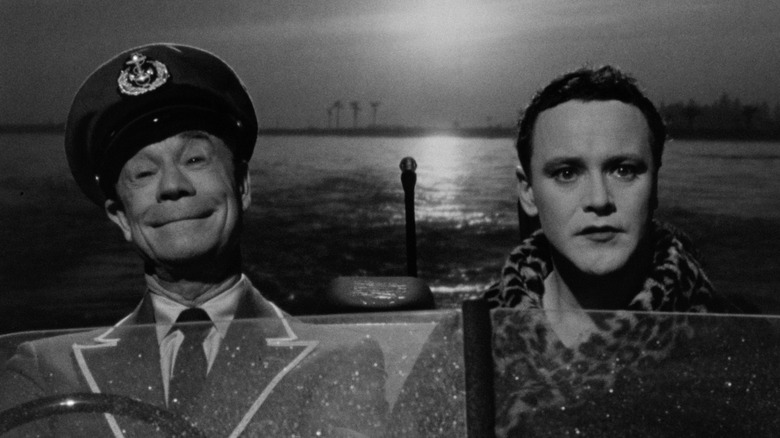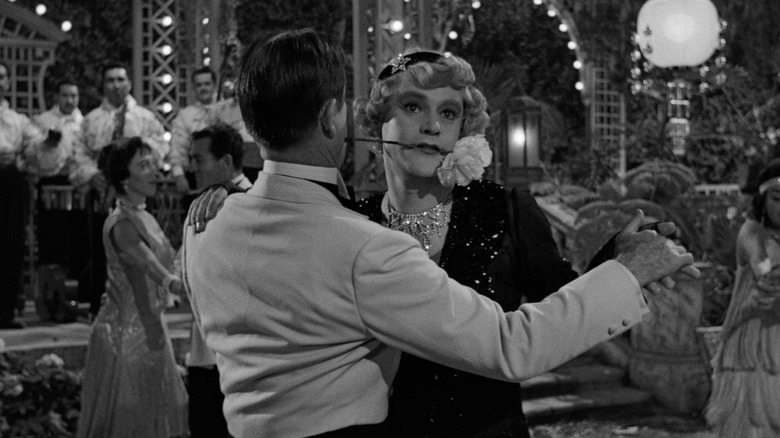Some Like It Hot Was Never Supposed To Feature Its Famous Final Line
If you were to rank the greatest final lines in the history of cinema, the films of Billy Wilder will probably have a few of them, and there is an incredibly strong chance that one of his films would be atop that list. I am talking about the immortal final lines of his 1959 comedy "Some Like It Hot." They are two words so incredible that he even enshrined them on his own gravestone. Those words are, of course, "Nobody's perfect."
This line, uttered by the wonderful character actor Joe E. Brown, serves as the greatest joke to cap off a movie filled with exquisite verbal and physical gags. They feel as if the entire story about two male musicians (Jack Lemmon and Tony Curtis) disguising themselves as women to hide from the mob were designed just to get to that endpoint, where Lemmon's character reveals to Brown's hilariously named Osgood Fielding III that he is not a woman. Not only is it funny for being an unexpected retort to the reveal, but in 1959, it was daring to more than heavily imply a character's queerness.
However, that was never the case. In fact, "Nobody's perfect" was never meant to be the film's final blow. Yes, that seems completely inconceivable, but Wilder and his co-writer I.A.L. Diamond only ever meant to have that line as a placeholder. "Nobody's perfect" was not thought of as the perfect line.
'Only for the time being'
Working with a co-writer gives you the opportunity to bounce ideas back and forth, which can prove to be incredibly beneficial. If you are dealing with people who aren't overly precious about their material, you have the luxury of having the best idea winning out. The collaboration also allows people to build off of one another to improve something they already thought was good to begin with. In an interview with The Paris Review back in 1996, Billy Wilder spoke of his writing of the ending of "Some Like It Hot" with I.A.L. Diamond and how they created that iconic final moment.
"[S]ometimes with writing you just can't tell, especially if you're writing under pressure. Diamond and I were writing the final scene of 'Some Like It Hot' the week before we shot it. We'd come to the situation where Lemmon tries to convince Joe B. Brown that he cannot marry him.
'Why?' Brown says.
'Because I smoke!'
'That's all right as far as I'm concerned.'
Diamond and I were in our room working together, waiting for the next line — Joe B. Brown's response, the final line, the curtain line of the film — to come to us. Then I heard Diamond say, 'Nobody's perfect.' I thought about it and I said, Well, let's put in 'Nobody's perfect' for now. But only for the time being."
Even as they put those words to paper, they didn't immediately think it was perfect. How could they? The writing process is a space for trial and error, and there were probably things they wrote that they thought were hilarious but fell flat when someone else heard them. Second guessing yourself in writing is one thing, but second guessing yourself while shooting is even more risky. Yet, Wilder and Diamond still had their doubts even after seeing how perfectly Joe E. Brown's delivery:
"We thought about it all week. Neither of us could come up with anything better, so we shot that line, still not entirely satisfied. When we screened the movie, that line got one of the biggest laughs I've ever heard in the theater. But we just hadn't trusted it when we wrote it; we just didn't see it. 'Nobody's perfect.' The line had come too easily, just popped out."
You would like to think that people who create the greatest moments in cinema history know that they are making them at the time. But they never do. Every filmmaker gets completely in their own head about every little decision they have to make for the picture that sometimes the stuff they just did for expediency or convenience end up making the movie. Only an audience can determine what stands the test of time and what doesn't, and they gave "Nobody's perfect" their ringing endorsement. Over 60 years later, that endorsement still stands.

